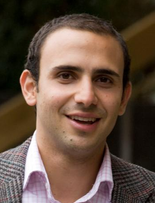Socially Contagious: How Microclinic International is Spreading Healthy Behaviors
Editor’s Note: This week we’re launching NextBillion Health Care, a new blog focused on deliverying medical services and products to low-income patients and consumers.
While it’s sometimes convincing, that same message is bound to influence you more if it comes from a good friend – or beyond just a good friend, if everybody you know has already bought those shoes. Our decision-making is tangled up with those around us.
Daniel Zoughbie isn’t selling anything, but his premise is the same: Social networks influence our health-related behaviors – our diets, our addictions, our penchant for physical exercise. Just as buying behaviors are socially contagious, so too are healthy behaviors.
Zoughbie, a 2012 PopTech Social Innovation Fellow, founded Microclinic International (MCI), an organization working to prevent and manage disease by leveraging the influence of social networks. Now on three continents, the organization’s “micro-clinics” aim to address poor health by calling upon a patient’s network of friends and family to change behaviors together. I spoke with Zoughbie at this year’s PopTech conference where he described the approach and its origins.
As a UC Berkeley student, Zoughbie traveled to Palestine where diabetes – one of the country’s largest health issues – is taking a grim toll on the population. The illness is exacerbated by endemic poverty and a decrepit health care infrastructure. Yet Palestinian communities also enjoy strong social ties – an underutilized resource, Zoughbie found, in such a resource-constrained environment.
“In places where endemic poverty is prevalent, in places like the West Bank where healthcare infrastructure is not dependable, there’s still a tremendous amount of social capital,” Zoughbie explained. So, what if that capital could be mobilized to spread positive decision-making as a strategy to address diabetes? What if those tight networks worked to improve Palestinians’ health?
Healthy eating habits, for example, aren’t solely an outcome of individual decision-making – they’re influenced by one’s family, friends, and more broadly by cultural norms. So any approach to preventing diabetes that ignores social networks falls short of addressing the problem. “[Residents’] behaviors are fundamentally and inextricably linked to those around them,” Zoughbie said. “When a mother cooks for the family, her decision of what to cook affects that entire social unit. She’s in turn influenced by other mothers.”
 MCI – which now operates in Jordan, Appalachia and Kenya, and previously in the West Bank and India – relies on local partners that are already embedded in the health care system to mobilize patients and conduct the clinics. When, for instance, a diabetic woman arrives at a partner health center, the disease management micro-clinic is offered as a complementary service. But to join the program, the patient is told that she must bring family and friends to participate as well. She and a few friends might enroll, along with 20 or so others – and over the course of the program, healthy behaviors to manage diabetes (and prevent it in others) are taught, discussed and practiced.
MCI – which now operates in Jordan, Appalachia and Kenya, and previously in the West Bank and India – relies on local partners that are already embedded in the health care system to mobilize patients and conduct the clinics. When, for instance, a diabetic woman arrives at a partner health center, the disease management micro-clinic is offered as a complementary service. But to join the program, the patient is told that she must bring family and friends to participate as well. She and a few friends might enroll, along with 20 or so others – and over the course of the program, healthy behaviors to manage diabetes (and prevent it in others) are taught, discussed and practiced.
(Left: Daniel Zoughbie, founder of Microclinic International. Photo courtesy of PopTech.)
“Our program doesn’t just take a woman, bring her into our program, and send her back home,” Zoughbie explained. “We ask her to bring her husband, her sister, her best friend who lives next door. And they come into the program as a cohesive social unit that was preexisting, that we didn’t create artificially.” The approach is bearing results: In one internal study, the micro-clinic’s intervention sustained patients’ blood sugar and weight reductions over a two-year period.
Underlying MCI’s proposition is a bigger idea regarding how we conceptualize and approach global health. “We’re so accustomed to thinking about health in an individualistic and medicalized way,” said Zoughbie. Too often, this leads to diagnoses and treatments that are provided in isolation of patients’ social context, and a tendency to address the biological rather than social determinants of disease. But MCI, he said, “sees the social context as part of both the problem and the solution.”
That approach – accounting for social context when understanding poor health and leveraging social context when addressing it – is gaining support in medical literature. For example, a widely cited 2007 study in the New England Journal of Medicine discovered “network phenomena” among obese people, concluding that “obesity appears to spread through social ties.” A 2011 study helped to further quantify the “social contagion of obesity,” finding that the more obese one’s social network, the more likely one is to be obese as well.
That we influence and are influenced by each other is not a radical idea. It certainly feels intuitive when we talk about buying trendy shoes. The challenge taken up by MCI is how to make that truth work in health’s favor.
- Categories
- Education, Health Care, Technology, Telecommunications
